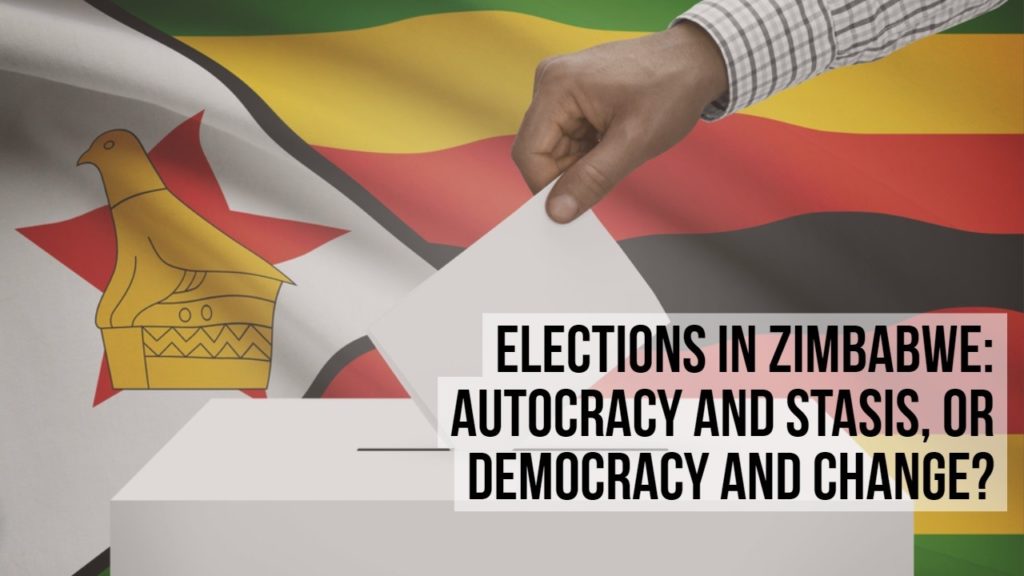
Since the Movement for Democratic Change’s founding in 1999, Zimbabwe has been going through a protracted struggle for democratization. An entrenched incumbent, fortified by a strong political-military network, has met aspirations for democratic improvement with strong resistance. This network, however, underwent a serious rupture last November when former allies effectively deposed its long-serving leader, Robert Mugabe. The new president, President Emmerson Mnangagwa, has scheduled general elections for July 30, 2018. The upcoming polls present new political dynamics and a heightened level of anticipation both within and outside Zimbabwe.
 Seven weeks before the poll, two prominent international democracy groups are urging the government and its Zimbabwe Election Commission (ZEC) to ensure reforms that guarantee a credible election:
Seven weeks before the poll, two prominent international democracy groups are urging the government and its Zimbabwe Election Commission (ZEC) to ensure reforms that guarantee a credible election:
The elections – for presidential, legislative and local office – will take place less than a year after the military intervention that led to Robert Mugabe’s removal from power after 37 years, and the appointment of Mnangagwa keeping the Zanu PF party in power. The elections also follow 18 years of political crisis, the International Republican Institute (IRI) and the National Democratic Institute (NDI) noted in their joint report.
In a forthcoming presentation, Dr. Alex Magaisa (left) will consider the struggle to achieve greater democratic accountability in today’s Zimbabwe. He will assess preparations for the approaching elections and discuss the prospects for democratization, including possible post-election scenarios and the roles of the military and the international community. Comments by Dr. Alexander H. Noyes will follow.
“Elections in Zimbabwe: Autocracy and Stasis, or Democracy and Change?”
featuring
Alex Magaisa (right)

Dr Alex Magaisa
Reagan-Fascell Democracy Fellow
with comments by
Alexander H. Noyes
Senior Associate (Non-resident), Africa Program
Center for Strategic & International Studies
moderated by
Natalie Kay
Program Officer, Southern Africa
National Endowment for Democracy
Tuesday, July 10, 2018
3:00 p.m.–4:30 p.m.
1025 F Street, N.W., Suite 800, Washington, D.C. 20004
Telephone: 202-378-9675
Dr. Alex Magaisa is a prominent Zimbabwean lawyer and constitutional expert currently teaching law at the University of Kent in England. Between 2012 and 2013, he was chief of staff and principal advisor to Morgan Tsvangirai, then Zimbabwe’s prime minister in a coalition government and leader of the Movement for Democratic Change, the country’s main opposition party. In 2011–2012, Dr. Magaisa served as a key advisor to COPAC, the parliamentary committee that wrote Zimbabwe’s new Constitution, which was approved at a referendum and signed into law in 2013. He is the author of a widely acclaimed blog offering in-depth analyses of law and politics in Zimbabwe.
Dr. Alexander H. Noyes is a senior associate with the Africa Program at the Center for Strategic and International Studies, an adjunct political scientist at the RAND Corporation, and an adjunct research staff member at the Institute for Defense Analyses. During his doctoral studies he carried out extensive research in Zimbabwe and recently traveled to Zimbabwe for a pre-election assessment mission. Dr. Noyes served as the team lead for Niger and Nigeria at the U.S. Security Governance Initiative, a White House initiative housed at the Department of State and focused on improving security-sector governance in six African countries.







